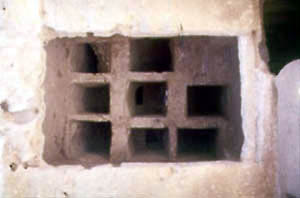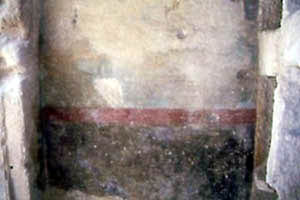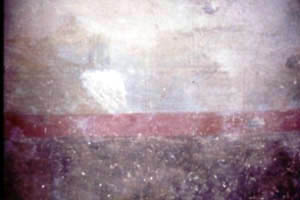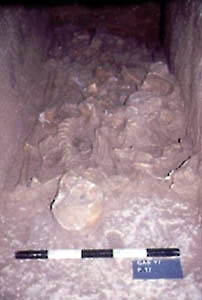GABBARI
Tomb B1 - chamber B1.5
In its original state the chamber B1.5 held no loculi. It had a bench cut into the walls on three sides and a niche, which still bears some vestiges of decoration at its top. This was a ceremonial or prayer space. In its second stage of development the chamber kept the same function and its walls received a particularly careful painted decoration. In a third stage the chamber changed function and loculi were dug into two of its walls. The painted decoration remained but the loculi received their own décor.

The painted decoration
The chamber has a painted decoration on the flat surfaces of the walls designed to represent cut stone building blocks. One can see three parts to the wall : a lower course of squared-off blocks in black, their edges marked with a red line, an upper course of red blocks and then four courses of blue painted "blocks". Above this middle part of the wall there is a black band topped by a red band. Above this and right up to the top of the vault, the wall seems to be painted yellow. The blocks of the middle section bear a trompe l'oeil boss effect: the painter has painted the lower horizontal and left-hand vertical framing lines in a yellow ochre while the upper horizontal and right-hand vertical lines are in black in order to play with the light and create an illusion. It looks as if the light is coming from the door, to the left and lower down.



Anthropology
The loculi, 2 metres long, 60 cm wide and 80 cm high, received the buried corpses. The body was placed most often with its head towards the entrance to the loculus. One sole loculus could contain several bodies and was used many times over. The bones of the first deceased were pushed to the sides or the far end of the loculus. Tomb B1 holds more than 220 loculi and certain of them held up to ten individuals.
Photos CEA - All rights reserved